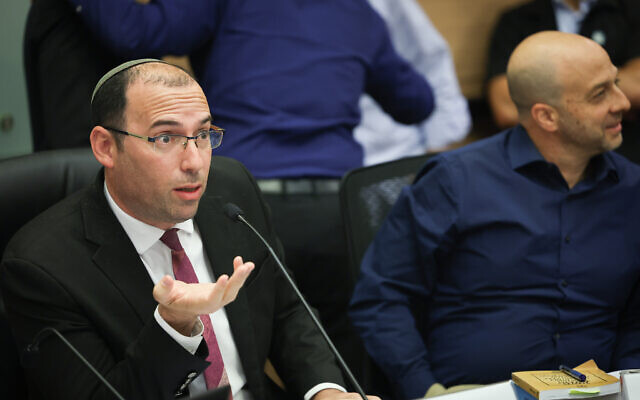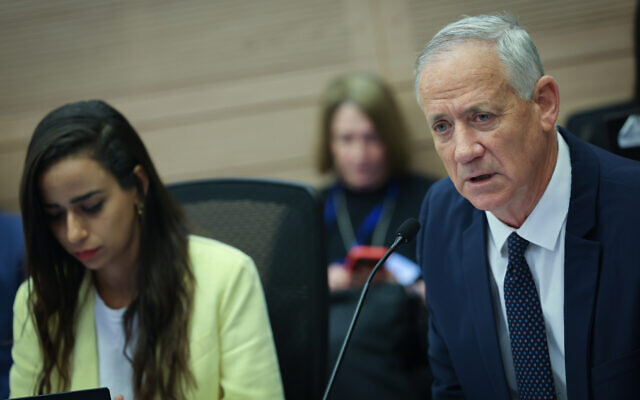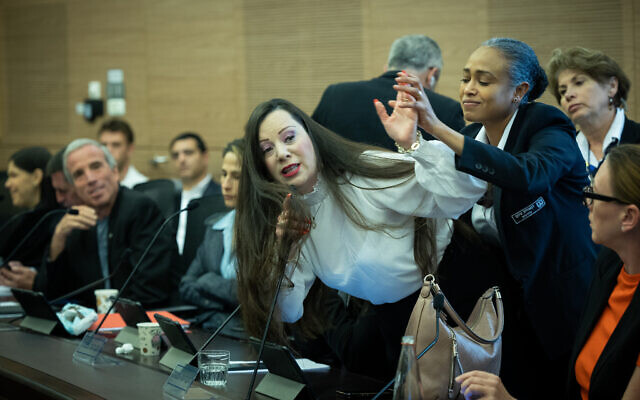Knesset restarts judicial overhaul with bill to broadly outlaw ‘reasonableness’ test
Rothman says nixing court review of decisions by elected officials is ‘democratic;’ legal adviser warns bill is ‘too broad’ and opposition says it’s a pathway to ‘corruption’
Carrie Keller-Lynn is a political and legal correspondent for The Times of Israel

Deliberations began Sunday on the coalition’s bill to broadly outlaw judicial review of the “reasonableness” of government or ministerial decisions, officially restarting the judicial overhaul three months after Prime Minister Benjamin Netanyahu froze the controversial legislative package.
Speaking in the Knesset’s Constitution, Law and Justice Committee, bill sponsor and committee chair MK Simcha Rothman said the move “serves the democratic interest” by giving more weight to the decisions of elected leaders than to those of unelected judges.
In a heated debate, opposition lawmakers slammed the bill as the first step in a collective vision to curtail judicial checks on political power. Opposition party head Benny Gantz said that canceling court oversight over the “reasonableness” of decisions made by ministers and other elected officials sets the stage for corruption.
“This is a law for whitewashing corruption. It’s a law that removes limits from the government,” the National Unity party chief told the committee.
Presented as an amendment to the existing Basic Law: The Judiciary, the bill would completely block courts, including the High Court of Justice, from invalidating decisions or appointments made by the prime minister, the cabinet, ministers, or other elected officials based on their “reasonableness.”
Going beyond past proposals, the legislation would prevent courts from even holding hearings on the reasonableness of a barred decision. Decisions made by unelected officials would still be justiciable.

A spokesperson for Rothman said that the committee will have to decide which elected officials — apart from the cabinet and its individual ministers — would be shielded by the bill, which currently reads “other elected officials determined by law.”
Such blanket curtailments are “too broad,” said the Knesset Constitution Committee’s legal adviser, Gur Bligh.
He testified that the bill should be limited to focus only on specified areas of decision-making.
“It’s not just who makes the decisions, but what kind of decision” that should be addressed, Bligh said.
In his legal opinion released before the committee’s Sunday discussion, Bligh encouraged lawmakers to limit the ban to certain fields, such as government policy on the economy.
Bligh also suggested that, parallel to reducing judicial oversight over politicians, lawmakers should create mechanisms that would improve transparency of government decisions, in place of court hearings.
Reasonableness has been the primary judicial check against appointments, and was used earlier this year to remove Shas leader Aryeh Deri from twin cabinet postings, citing his recent tax offenses and past bribery conviction. Opposition lawmakers have warned that without the reasonableness protection, the government would be able to fire the attorney general and appoint personal cronies in her place, an example raised on Sunday.

The coalition plans to fast-track the bill to become law during the month remaining in the Knesset’s summer session, and Sunday’s discussion is the first of three that the Constitution Committee is scheduled to hold on the matter this week.
The bill was prioritized by the coalition shortly after opposition lawmakers withdrew from judicial reform compromise talks following a stymied election of MKs to the Judicial Selection Committee earlier this month. The coalition, meanwhile, said it plans to move ahead with efforts to revamp the committee in the upcoming winter session.
Opposition lawmakers attacked the reasonableness bill as the first step in a ruinous legislative strategy.
“This is part of a full plan to hurt democratic institutions,” said National Unity’s Orit Farkash Hacohen, who charged that at the root of the overhaul lay “corruption.”
Yesh Atid lawmaker Karine Elharrar added that eliminating the reasonableness test over decisions by ministers and other elected officials “is the first thing in the Poland protocol,” a reference to recent governmental changes in Poland that have been decried as anti-democratic.
“They do it bit by bit, in moderate steps, and in the end they control the system,” she said.
Coalition lawmakers defended the proposed bill on Sunday, saying that elected officials are those who should be making policy, not judges.

“It’s not reasonableness, it’s policy,” said Likud MK Amit Halevi. The court “swaps” its position for that of elected officials, he charged.
Fellow Likud lawmaker Tally Gotliv said she backed the move, but wanted to protect the rights of citizens to petition local authorities, which could be blocked by an expansive reading of “other elected officials.”
Gotliv, who was later booted from the committee by Rothman for disorderly conduct, also said that changing the reasonableness test alone would not constitute a satisfying judicial reform.
The reasonableness test is a “drip, drizzle of the reform, let’s put it on the table,” she said.
Touching on this point, Gantz said that his party “will absolutely not accept” the bill, saying it’s part of a piecemeal strategy leading to a judicial overhaul.
“We can’t negotiate on a judicial revolution in installments. Today it’s this law, tomorrow it’s that bill,” he told the committee.
Despite withdrawing from judicial reform negotiations two weeks ago, Gantz called on the coalition to “stop it all” and meet his conditions for returning to dialogue: electing and seating the Judicial Selection Committee, and not pursuing unilateral overhaul legislation.
While he did not address the committee directly, opposition leader Yair Lapid similarly called on Netanyahu to halt the reasonableness bill.
“In order to prevent an internal collapse of Israel, Netanyahu must stop the unilateral legislative processes in the Constitution Committee before they get out of control, and complete the process of establishing a committee to select judges,” he wrote on Facebook on Sunday morning. “After that, we can return to the President’s Residence,” where talks have been held, “and continue the negotiations until we reach agreements that will preserve democracy and prevent a national disaster.”

“If the government tries to take over the Judicial Selection Committee or erode the independence of the Supreme Court, we will leave the President’s Residence immediately. As long as this is not on the agenda, we must continue to try to reach an agreed-upon outline that will preserve Israeli democracy,” he said.
However, Lapid’s Yesh Atid party has been adamant in denying coalition claims that it agreed in principle to changes in the reasonableness clause during talks, and negotiating team member Elharrar reaffirmed that there were “no agreements” made during her remarks to the committee.
Netanyahu and coalition officials blame the opposition for blowing up talks, saying the opposition quit negotiations despite receiving the one representative they demanded to sit on the Judicial Selection Committee. Opposition lawmakers say their victory is irrelevant if the committee never meets to pick judges.
As the opposition and coalition continue to squabble over who is to blame for the frozen negotiations, Rothman said that talks were failed from the start, accusing opposition politicians of using the dialogue to “create chaos.”
“The public was exposed to the fact that the your whole goal in talks was to create chaos, that you left the talks,” said Rothman, to shouts from opposition politicians.
“The public understands very well that the purpose of talks was not to come to agreements but to create a trigger for explosion. You made a mistake in that you revealed this,” he added.









